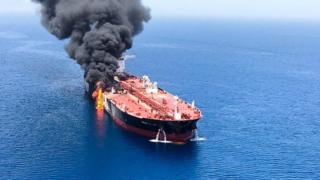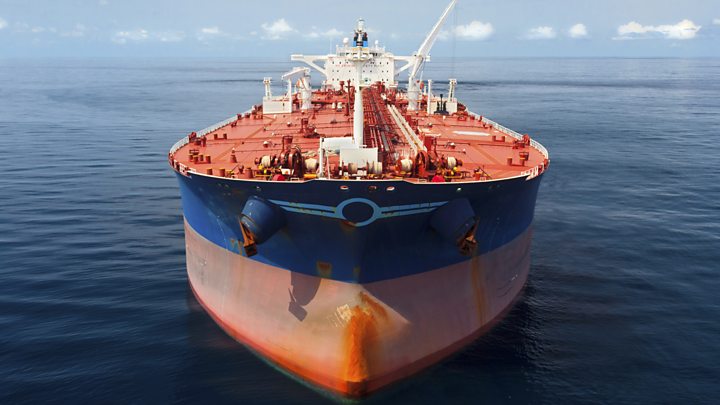Home » Middle East »
What we know about Gulf of Oman tanker ‘attacks’
Two tankers have been damaged by explosions in the Gulf of Oman, a strategic waterway crucial to global energy supplies.
It is the second time in the past few weeks that tankers appear to have been attacked in the region and comes amid escalating tension between Iran and the United States.
US Secretary of State Mike Pompeo said Iran was behind what he described as the latest in a series of “unprovoked attacks”. He said the US had made its assessment based on intelligence about the type of weapons used.
But a senior Iranian official told the BBC: “Iran has no connection with the incident.”
What happened on Thursday?
The Panama-listed Kokuka Courageous and the Marshall Islands-flagged Front Altair were both sailing south-eastwards through international waters, after passing through the Strait of Hormuz, when they were rocked by explosions.
The Front Altair was carrying 75,000 tonnes of naptha from the United Arab Emirates to Taiwan.
Its managers, International Tanker Management, said a fire broke out on board following an explosion. The master decided to abandon the vessel and the 23 crew members, who were unharmed, were picked up by the cargo ship Hyundai Dubai.
Taiwan’s state oil refiner CPC Corp, which had chartered the vessel, told Reuters news agency that it was “suspected of being hit by a torpedo” at about 04:00 GMT.
The tanker’s owner, Norwegian company Frontline, denied reports that it had sunk and said the crew – 11 Russians, 11 Filipinos and one Georgian – were transferred from the Hyundai Dubai to an Iranian navy vessel and taken to a local port.
Photographs published by Iranian media showed a fire on Front Altair’s starboard side, and a huge column of black smoke towering above it.
The Kokuka Courageous was reportedly carrying about 25,000 tonnes of methanol from Saudi Arabia to Singapore.
Its managers, Bernhard Schulte Shipmanagement, said the vessel was damaged “as a result of a suspected attack” that breached the hull above the water line on the starboard side. There was a fire in the engine room, but the crew was safe, with one minor injury reported, it added.
The president of the Japanese company that owns the vessel, Kokuka Sangyo, said it was hit twice before the crew abandoned ship.
“We have had an initial report that our ship… was hit by a shell. After that, our crew saw that other ships came under fire and moved around to avoid this,” Yutaka Katada told reporters. “Three hours later it was hit again.”
Iran’s state news agency, Irna, said the first incident occurred on the Front Altair at 04:20 GMT, when it was 25 nautical miles (46km) off the Iranian port of Jask. At 05:20, the Kokuka Courageous caught fire about 28 miles off Jask, it added.
Irna cited an informed source as saying that an Iranian naval rescue unit from Hormozgan province had rescued 44 crew members from the two tankers, and transferred them all to Jask.
The US Navy’s Fifth Fleet, which is based in Bahrain, said its forces in the region received two separate distress calls at 03:12 GMT and 04:00 GMT, and that USS Bainbridge, a guided missile destroyer, “rendered assistance”.
A US defence official told CNN the USS Bainbridge had been nearby when the incidents happened, and that it took on board 21 crew members rescued by a tug boat from the Kokuka Courageous.
Another official told CBS News the US believed it would be able to recover enough debris “to come up with solid evidence for tracing them back to their source”.
What has been the reaction?
UN Secretary General António Guterres said he strongly condemned any attack against civilian vessels and warned that the world could not afford “a major confrontation in the Gulf region”.
EU foreign policy chief Federica Mogherini called for “maximum restraint”.
The acting US permanent representative to the UN, Jonathan Cohen, said it was “unacceptable for any party to attack commercial shipping” and that Thursday’s incidents “raise serious concerns”.
“Suspicious doesn’t begin to describe what likely transpired this morning,” said Iranian Foreign Minister Mohammad Javad Zarif, noting that it came as Japan’s prime minister met Iran’s supreme leader to discuss how to ease regional tensions.
Paolo d’Amico, chairman of the International Association of Independent Tanker Owners, warned: “We need to remember that some 30% of the world’s crude oil passes through the Strait [of Hormuz]. If the waters are becoming unsafe, the supply to the entire Western world could be at risk.”
What happened in May?
Four tankers were damaged by explosions within the UAE’s territorial waters in the Gulf of Oman, east of the emirate of Fujairah, in the early hours of 12 May.
The vessels were the Saudi Arabia-flagged Amjad and Al Marzoqah, the Norwegian-flagged Andrea Victory, and the UAE-flagged tanker A Michel.
There were no casualties, but the explosions blew holes in the tankers’ hulls. Saudi Arabia’s government said the two Saudi ships suffered “significant” damage.
A report presented by the UAE to UN Security Council in members said the blasts were the result of “a sophisticated and co-ordinated operation carried out by an actor with significant operational capacity, most likely a state actor”.
The report said the operation involved small, fast boats and trained divers, who were likely to have placed limpet mines with a high degree of precision on the vessels’ hulls below the waterline. Their intention, investigators concluded, was to disable the vessels but not destroy them. The four explosive charges were all detonated within less than an hour, according to the report.
The report stopped short of directly accusing a particular country.
However, Saudi Arabia’s permanent representative to the UN, Abdallah al-Mouallimi, said it believed that “responsibility for this action lies on the shoulders of Iran”, saying: “We believe there is enough evidence to demonstrate that.”
US National Security Adviser John Bolton has said the explosive charges were “naval mines almost certainly from Iran”, without providing any evidence. A US destroyer in the region also reportedly tracked 20 Iranian military boats entering UAE waters a few hours before the explosions.
Iran dismissed Mr Bolton’s accusation that it was involved as “ridiculous”.
Source: Read Full Article




